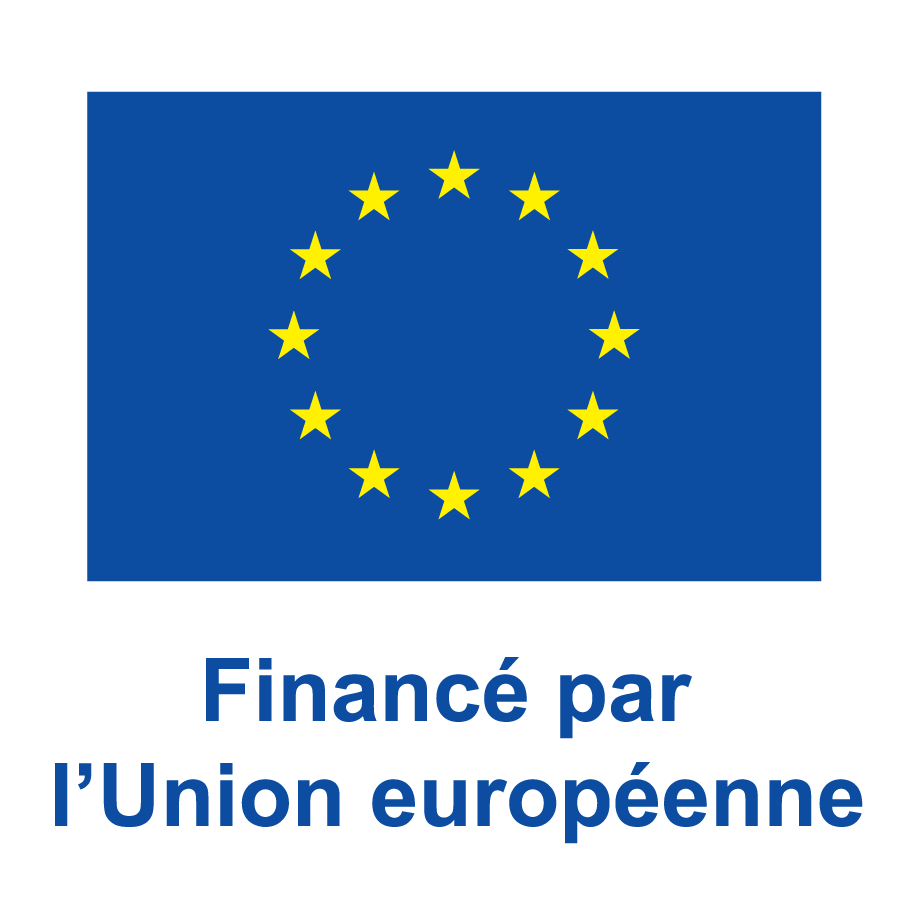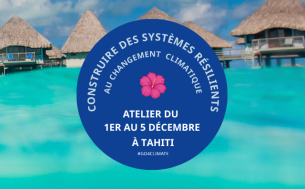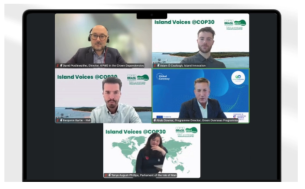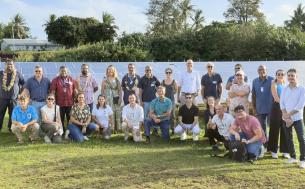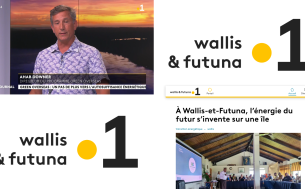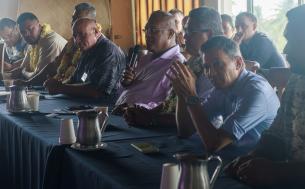
Publié le 04/07/2025, mis à jour le 04/07/2025
From the Islands to the World: The Voice of an Ocean-Committed Youth – Episode 1/6 (Matthew Nagel)
-
In June 2025, the city of Nice hosted the third edition of the United Nations Ocean Conference (UNOC 3). In line with its strong commitment to the environmental and ecological resilience of European and UK Overseas Countries and Territories (OCTs), the Green Overseas Programme undertook an ambitious and long-term effort to make its participation in this major international event truly memorable.
From the outset, the Programme team worked to assemble a delegation of ten young people from the OCTs benefiting from the Programme. These ten delegates, representing a total of eight OCTs (New Caledonia, Bermuda, French Polynesia, Ascension Island, Montserrat, Sint Maarten, Saint Pierre and Miquelon, and Aruba), carried the voice and spirit of the Green Overseas Programme through a series of workshops, discussions, and conversations — reflections from which are shared through the personal accounts of each of them.
-
Living on an Island, there is nothing more all-encompassing than the waters around you. I still struggle to take in the enormity of the ocean when I look out past the horizon, knowing that it continues uninterrupted for hundreds, or even thousands of miles. How can something that seems so massive possibly be under threat by our actions? The Ocean has been viewed for so long as a seemingly infinite resource, constantly supplying to meet our ever-growing demands, but we know that that is not the case.
I was fortunate enough to be selected by the Green Overseas Programme, a project run by Expertise France and funded by the European Union, to attend the Third United Nations Ocean Conference, representing my home, Bermuda. The GO Programme brought together ten youth representatives from Overseas Territories to UNOC3, and one of the most rewarding aspects of that week was not just the conference itself, but the opportunity to meet and learn from these individuals. We have all have had our own unique journeys and experiences in life, but we all share one key aim: to protect the waters which we call home.
During my four days in Nice, I saw such incredible work being done to further ocean conservation and the development of a circular, blue economy. Innovative tools and programmes, like the European Digital Twin Ocean Project and Blue Alliance’s framework for financing MPAs, were showcased, while those from the communities at the forefront of the ocean crises and with deep historical connections to the sea were provided with platforms to share their stories, raise their concerns and promote their tested solutions. These developments and perspectives will be fundamental in correcting the course of humanity, away from exploitative practices which cannot be sustained at the current rates, towards a future where we forge a healthier relationship with the world around us, one that does not leave our shores choked with plastic, our reefs barren and our people poisoned.

-
A central theme was the development of financial tools, such as biodiversity bonds and other blue/green investments which will be instrumental for Small Island Developing States (SIDS) to gain greater independence and control over their own resources, moving away from the era of relying on philanthropy and the tourism sector. It is now being recognized that, while difficult to quantify directly, these measures are critical for the health of our global economy; the natural world forms the basis of all industries, and it is SIDS and coastal regions which contain the vast majority of these crucial resources.
The greatest barrier to their adoption is that, while profitable, securitisation and adequate return on investment have yet to be completely addressed and the benefits are largely invisible, existing in the long term. Whilst predictive models allow us to estimate the amount we will save by preventing the future fallout of climate change and ecosystem collapse, these numbers become much harder to defend when standing in front of investors or voters, comparing them to the extreme and immediate returns provided by exploitative practices like deepsea mining.
It is important to me that my experiences at UNOC do not just serve as a message of hope for the future, but as a call to continue the push forward: we have not yet turned the tide on our most pressing issues and we must continue the work underpinning the progress that has been made. It has been extremely encouraging to witness the strong presence of youth and indigenous peoples at UNOC3, but there is still more room to deepen their inclusion in the decision-making processes by key economic and political players. Additionally, while the recent push towards blue finance will be critical in restructuring our economies to promote long term environmental health, there is a danger that we may go too far in commodifying concepts like biodiversity. Many will simply continue to view the Ocean as another resource to exploit, ultimately, we must drive a shift in the prevailing attitudes when it comes to valuating the natural world and taking into account the perspectives of those at the front lines of the crisis. If we cannot recognize the inherent worth the Ocean holds, we run the risk of destroying exactly what we seek to protect.
-
As the next generation of innovators, leaders and scientists, we must ensure that we are not just passive observers waiting for our turn to take the reins when the time comes, but instead begin shaping our own futures now, claiming our seat at the table as stakeholders in the health of the Ocean and our planet as a whole. We cannot just demand change, we must be the ones to drive it forward.
I am extremely grateful to the entire Green Overseas Programme team, Expertise France, the European Union and the Bermudian Government for their support and this opportunity; my time at the third UN Ocean Conference will no doubt be an experience which I will never forget and which will have a lasting impact on the trajectory of my career and future.
